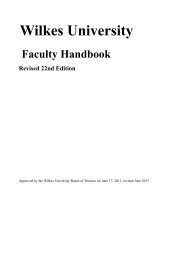WILKES UNIVERSITY
Wilkes University - Wilkes Portal
Wilkes University - Wilkes Portal
Create successful ePaper yourself
Turn your PDF publications into a flip-book with our unique Google optimized e-Paper software.
expressions as your own to gain an advantage constitutes fraud”(26). Academic writing<br />
assignments that require the use of outside sources generally are not intended to teach<br />
students to assemble a collection of ideas and quotes, but rather to synthesize the ideas<br />
they find elsewhere in order to construct new knowledge for themselves. This process<br />
requires a higher level of thinking than some students may have been trained to engage<br />
in, and inexperienced writers may be sorely tempted to copy wording they feel<br />
inadequate to improve or even restate. Plagiarism is a serious issue that violates most<br />
people’s sense of property rights, honest representation, and fairness.<br />
The University considers the following as three separate forms of plagiarism:<br />
Deliberate plagiarism centers on the issue of intent. If students deliberately claim<br />
another’s language, ideas, or other intellectual or creative work as their own, they are<br />
engaged in a form of intellectual theft. This is not tolerated in academic, business, and<br />
professional communities, and confirmed instances of plagiarism usually result in<br />
serious consequences. Similarly, submitting the work of another person or submitting a<br />
paper purchased from another person or agency is a clear case of intentional plagiarism<br />
for which students will be subject to the severest penalties.<br />
Unintentional plagiarism often results from misunderstanding conventional<br />
documentation, oversight, or inattentive scholarship. Unintentional plagiarism can<br />
include forgetting to give authors credit for their ideas, transcribing from poor notes,<br />
and even omitting relevant punctuation marks.<br />
Self-plagiarism occurs when students submit papers presented for another course,<br />
whether for the English department or another department or school. Students may<br />
submit papers for more than one course only if all instructors involved grant permission<br />
for such simultaneous or recycled submissions.<br />
Penalties for plagiarism may range from failure for the particular assignment to failure<br />
for the course. In accordance with the academic grievance procedures of Wilkes<br />
University, cases of plagiarism will be addressed first by the instructor. Any appeal by<br />
the student should be directed to the department chairperson. Students can avoid<br />
plagiarizing by carefully organizing and documenting materials gathered during the<br />
research process. Notes attached to these materials, whether in the form of informal<br />
notes, photocopied articles, or printouts of electronic sources, should carefully identify<br />
the origin of the information. Such attention to detail at every stage of the process will<br />
ensure an accurate bibliography that documents all the outside sources consulted and<br />
used. Students should follow these general principles when incorporating the ideas and<br />
words of others into their writing:<br />
1. The exact language of another person (whether a single distinctive word, phrase,<br />
sentence, or paragraph) must be identified as a direct quotation and must be provided<br />
with a specific acknowledgment of the source of the quoted matter.<br />
2. Paraphrases and summaries of the language and ideas of another person must be<br />
clearly restated in the author’s own words, not those of the original source, and must<br />
be provided with a specific acknowledgment of the source of the paraphrased or<br />
summarized matter.<br />
75



